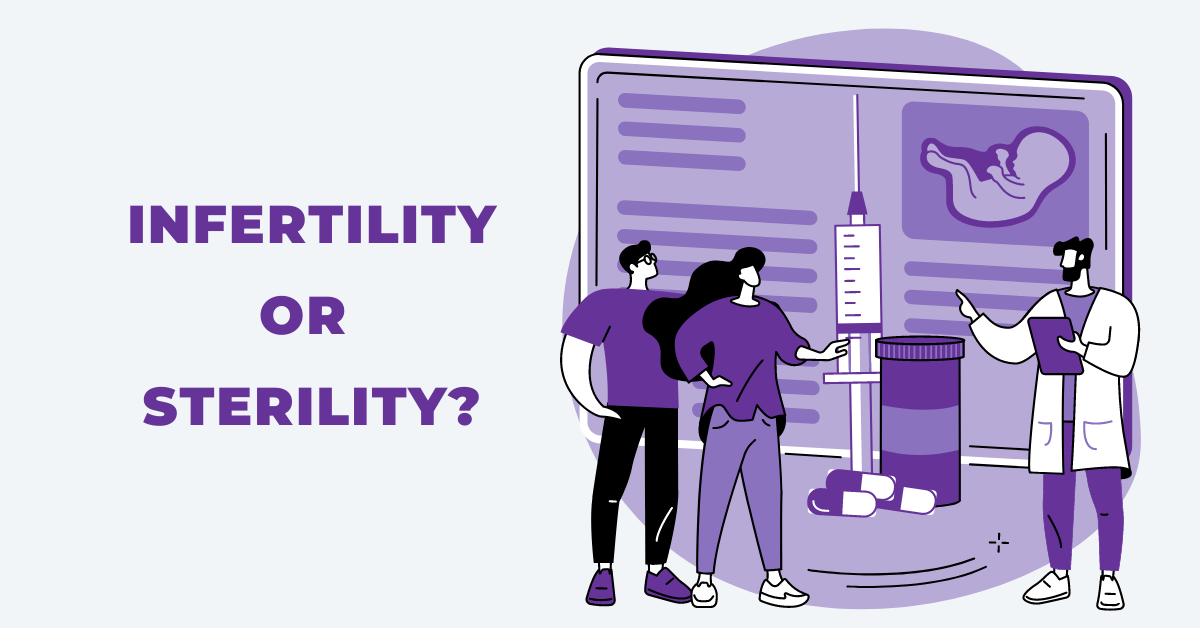Infertility and sterility are commonly mixed up. However, these two concepts are entirely different and describe different conditions, each with its own treatment options.
Very briefly, sterility is the inability to conceive, and infertility is the inability to complete a pregnancy and have a healthy child.
Many people think they are sterile, when in fact, they are infertile. The confusion in understanding the difference between these two terms has popularized many myths. So, let’s clarify these and other terms.
What Is Sterility?

Sterility is the inability to conceive a biological child without medical intervention. Both women and men can be sterile. In the case of men, it happens when sperm cells are absent in the semen. In the cases of women, this refers to the nonexistence of ovulation.
What causes sterility?
Sterility can be caused by congenital disabilities such as being born without ovaries in women or undescended testicles in men. In addition, surgical interventions (like tubal ligation, hysterectomy, or vasectomy) and health problems such as diabetes, infections, or HIV may also cause sterility.
Myths of sterility:
1. When a man has sperm problems, we often hear that he is sterile. This is incorrect. Men who have sperm issues may just be infertile.
2. Moreover, it is commonly said that sterility is as common as infertility, which is untrue since not everyone diagnosed with infertility is sterile. So sterility is far more common.
3. It is also common to hear that men who don’t have sperm cells in their semen can’t father children. Men can have an absence of sperm but still be fertile by using fertilizing treatments. For example, a doctor may extract sperm directly from the testicles and use it to fertilize an egg through IVF.
What is the sterility treatment?
A sterile person cannot conceive, whether through medical or surgical intervention or assisted reproductive technologies. There are no options for sterile people.
What Is Infertility?

Infertility is the inability to conceive a child after a year of having planned and unprotected sexual intercourse. In some cases, the time may be shortened to six months because the woman is 35 years or older.
Infertility is a problem that can affect both men and women. The most common infertility treatment is In-Vitro Fertilization – IVF.
What causes infertility?
Many factors cause infertility in men or women:
- Problems with ovulation: when a woman is not ovulating or when an egg is released during some cycles but not others – which can be a result of PCOS (polycystic ovary syndrome);
- Abnormal fallopian tubes or uterus;
- Overage – 35 for women or over 40 for men;
- Health problems such as diabetes, eating disorders and an unhealthy lifestyle (excessive alcohol and tobacco use);
- Endometriosis;
- Problems with sperm delivery: usually, these problems are due to a blockage in the testicle, structural problems, premature ejaculation, or genetic diseases;
- Overexposure to certain environmental factors, like radiations.
Depending on the factors causing infertility, it can be treated with medication, hormone therapy, or surgery.
Infertility myths:
1. Some people think that infertility is rare, but it isn’t. Infertility is quite common. Unfortunately, many people who face an infertility problem do not know it is infertility and believe that they are sterile without consulting a doctor.
2. Most couples don’t know about second infertility and think it is out of the picture because they already have a child. Unfortunately, the reality is that 30% of couples with infertility already have a child.
3. Age affects a woman’s fertility. This is true. Women over the age of 30 begin to have a reduced number of viable eggs. However, this is not limited to women – men older than 40 also experience a decrease in their semen volume.
What is infertility treatment?
Several medical and surgical options are clinically effective in treating infertility conditions. Some of these treatments include assisted reproductive technologies like intrauterine insemination (IUI), intrafallopian gamete transfer (GIFT) or in-vitro fertilization (IVF). They will help you achieve a successful pregnancy.
Primary infertility: it includes couples who have not conceived after one year of unprotected and planned sexual intercourse.
Second infertility: it refers to couples who already have a baby but are now unable to conceive. Learn more about secondary infertility here: https://monicabivas.com/what-you-should-know-about-secondary-infertility/
Main Differences In Coping With Infertility And Sterility

Since they’re different, there are distinct ways to cope with these two problems. Not getting pregnant for a while is not the same as being completely unable to conceive.
It isn’t easy coping with either of these two conditions, but here are a few tips that can help you:
1. Acknowledge your feelings: coping with infertility or sterility is undoubtedly a difficult emotional journey. Recognize your feelings and emotions rather than pretending you are okay. It is normal to grieve and feel sad and frustrated. Let your feelings out.
2. Always be honest with your partner: your partner is someone who will constantly be there for you. Make sure you share your feelings with them in a positive and healthy way.
3. Seek help: consider speaking with a therapist or a professional – it will help you express your feelings and feel better.
4. Acknowledge your options: the most frustrating feeling is not knowing what to do next. The better you understand your options, the better you know the steps you can take towards your happiness and wellbeing.
5. Find healthy ways to overcome your emotions: when you feel stressed or disappointed, try to find other ways to overcome these emotions. For example, write in your diary, exercise, go for a walk, or meditate.
6. Re-establish intimacy with your partner: during this journey, the relationship with your partner may be affected. Your intimacy may seem forced or only for conception reasons. So, dedicate time to your relationship and re-establish the intimacy you both had. Remember that both of you face a tough situation, so support one another.
7. Take care of yourself: don’t blame yourself or your partner. Focus your energy on the positive things you have in your life. Overcoming infertility or sterility can be overwhelming. Therefore, focus on yourself in ways that work best for you. For example, start doing an activity you enjoy but have never started or volunteer for a cause you support.
Overcoming infertility or sterility is the first step toward your wellbeing, happiness and health. Accepting infertility or sterility is not an easy task, and no one should have to go through it alone. Don’t be afraid of asking for help – it only means that you are doing something for yourself.

